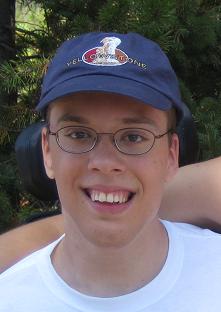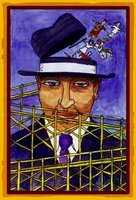Jury Duty

My mom called the courthouse a few weeks before my service date, finding out about accessible parking and the accessibility of the courthouse in general. She was also told that I would be able to have a caregiver.
I arrived with my mom, who was my caregiver for the day, at the courthouse at 9:45 a.m. The front entrance was nicely wheelchair accessible with a gently sloping ramp and a power door. I went through security. I appreciated the respect from the guard who looked me in the eye when he spoke with me. He seemed intrigued that even though I could have been excused, I still wanted to serve as a juror. He told me a little about himself and his job in the courthouse. We had a nice conversation while we waited for my mother to get through her longer security line.
I took the elevator to the third floor and checked myself into the juror waiting room. The sheriff was unfamiliar with the rules about people with disabilities and told me to check with his supervisor. When I met the supervisor, he immediately made eye contact with my mother rather than with me. He was reluctant to have me go through the jury process; he thought I should go home. My mom and I did the subtle things we usually do to encourage him to talk with me rather than with her. The supervisor told my mom that the cases involve sex offenders, kidnappers, and murderers and can “get pretty graphic”. He also stated that, at the ruling of the Chief Judge, no caregivers were allowed in the juror waiting room (contrary to what my mom had been told on the phone). The supervisor gave me every opportunity to get out of serving, but I refused. I wanted to serve. Interestingly, when I insisted that that was my decision, the supervisor’s eye contact with me improved, and we were able to have a productive, problem solving conversation. It was decided that my mom would wait outside the waiting area door and help me with bathrooming and eating during the break. If I were to be called for a case, I would work out the arrangements with the presiding judge.
There were a few hundred jurors in the waiting room. They were diverse ethnically and ranged in age from about 20 to 75. There were no other jurors in wheelchairs; one juror had a court-supplied sign language interpreter. The staff divided us into different groups, mine was number 10. No jurors were called in the morning so I just read a book, rested, and chatted a little (mostly about the Super Bowl) with the other jurors.
There was an hour and a half break for lunch. I met up with my mom and we took care of all my needs. Immediately after lunch, 5 groups were selected, but not my group number 10. About an hour later, group number 10 was called. I was excited. I thought I would be going to jury selection for a case. However, our group was informed that the defendant in our case had chosen a bench trial instead of a jury trial and that we were excused to go home.
I think I made a good choice to serve on jury duty, even though I could have gotten excused. I am hoping that my fellow jurors and the courthouse staff took advantage of the opportunity to view me as a fellow member of the jury pool.
Lately, I have been wondering if I make an impact on dismantling the ableist assumptions of society simply by doing ordinary things. When my disability is seen as part of the diversity of society, maybe that helps change attitudes. I know I have a lot of valid reasons, such as fatigue, pain, inaccessibility, hassle and more, to discourage my participation, but perhaps by doing everyday things like serving on jury duty or going to the movies or going shopping, a deeper realization of disability as part of diversity takes place.










5 comments:
"I have been wondering if I make an impact on dismantling the ableist assumptions of society simply by doing ordinary things. When my disability is seen as part of the diversity of society, maybe that helps change attitudes. "
The answer is YES, you do make an impact, you do help change happen. Everyone who noticed you in that room goes home knowing (if they didn't already) that disability isn't the opposite of citizenship, that sometimes 'a jury of your peers' includes disabled peers.
Great post David. I went for jury duty once, and was extremely disappointed when I found that no ethnic minorities (though plenty that ended up getting called) and nobody under age 30 ended up being on the jury! I've taken politics classes that have included discussions about the ways that juries are poorly selected and are so infrequently fair, so I'm not surprised.
I definitely think that you made an impact, if not on many people then just on the few people who may not have expected you to insist on going through the jury selection process. And I hope they work on their policies for caregivers; that's certainly an accessibility issue.
I think it's great that you did that, even though it's a difficult day. I agree 100% that the more we see disabled people in the community, the less we can forget about them, the less we can assume they aren't human, the less we can assume they don't matter. I never realized many of these issues until the Ashley case.
Like you, my own Dear Son requires a lot of assistance. It's not easy to go places. I appreciate your candor in how you talk about things. I feel sometimes when I read your blog that I am reading about my own son. Although my own son can't speak and doesn't have your mental capacity, some of his physical issues are the same. I have often wondered what it's like and when you write, you help me understand those things. I imagine your voice in a place like a jury would do the same thing, helping people understand the challenges and issues that disabled people face.
Keep getting out in the community and keep writing. We need to hear more about your perspective.
Absolutely. Everytime any one of us makes it out the door and into common areas, by our presence we jog peoples preconceptions either a little or a lot. We make a difference for not just ourselves but those who encounter us.
Yes, you change the world. Go give it some hell.
WCD
Post a Comment